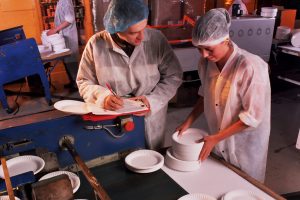Lancashire set big investment tests at leaders round table
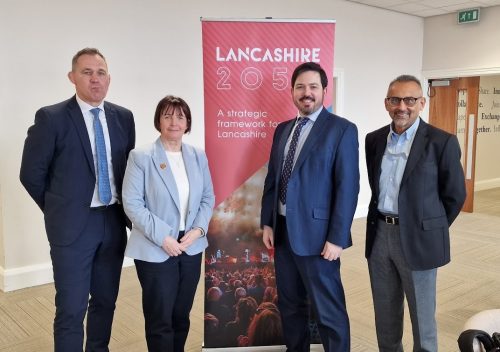
Lancashire has everything to play for, has great manufacturing businesses, universities, and scores high on many quality of life indexes, but is held back by infrastructure and connectivity issues.
That was one of the conclusions from TheBusinessDesk.com’s round table discussion at County Hall in Preston, attended by leaders across the county from political, civic and business leadership positions.
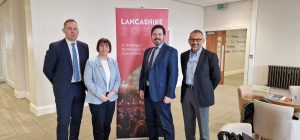
John Chesworth, Cllr Phillippa Williamson, Alex Turner and Manesh Pandya
There was broad consensus on the quality of life that Lancashire offers families and, particularly, returners, but much more needs to be done to attract businesses to invest in this part of the North.
Case in point: Manesh Pandya, chief executive of ELE Advanced Technologies, based in Colne said he can get international customers to Manchester very easily and that’s he’s been able to bring in investors from the south to catch a train to Preston, but that the connectivity breaks down when they might have to take a train to the east of the county in Colne.
On a positive he said: “One thing which has improved has been the access to good quality hotels, conferencing facilities and restaurants. So when you’ve got an international customer base, you need to have options available for them.
“Getting AMRC to establish themselves in the North West will be a very positive step, we have lots of good universities around us but we have to try and get home students to remain within Lancashire after they qualify and remain within the engineering and technology sector rather than being attracted to the South.I think that is the big challenge. So how do we make this region more attractive for young people to remain with it.”
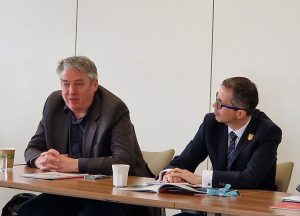
Michael Gibson and Cllr Aidy Riggott
Michael Gibson, managing director of Lancaster-based EV charging business Fuuse, and a Lancaster native who returned from London himself, said the lack of office space in Lancaster was an issue. Pointing out that no new office space has been built in Lancaster since the Second World War, a problem that has left businesses like his, and his previous company Fat Media, with no room to grow.
“We wouldn’t be there if it wasn’t for the university. Rentals are actually too low. What we want is high grade, you’re never going to get developers to try that out.”
He cited the example of Limerick in Ireland where the local authority made an intervention to invest in high quality space to stimulate the market.
John Chesworth, from the law firm Harrison Drury and a driving force behind the City of Preston Town Deal Board as its chair, and clearly someone involved with a body that has a direct purpose to drive the future development of Preston, cited a similar issue for Preston.
“There’s real talent in our professional services, but we are also leaking work down the M61 to Manchester. We need grade A office in Preston to keep those high skilled jobs in Preston city centre.”
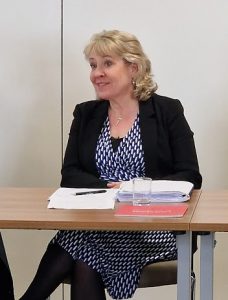
“I think the opportunities are vast, we’re fortunate that we are working on a number of them. It is challenging from a viability perspective, because unfortunately, as we all know, around inflation and construction costs, that has meant that it makes it difficult to get some of these projects off the ground. And because you don’t have already a Grade A office rent that makes it affordable, to make the economics work out. That’s partly why some haven’t been delivered. So it needs to be a combination of the public and private sector, working together.”
She said there is ample industrial space, but for some of those town centre opportunities, it comes down to place making,
“So youngsters want that job, whether it’s at the AMRC, or whatever, it might be digital innovation, any of the businesses all around this table. But they also want to be here in Lancashire, because of what the greater offer is.
“And they can easily hop on a train and get to Manchester, you know, you’ve got to look at Greater Manchester as a positive to Lancashire.”
She said when she worked at Salford City Council in regeneration colleagues looked at Lancashire in an envious way because of its businesses, especially in manufacturing.
“It’s about having the right product, being brave and ambitious. And a lot of the opportunities that have happened in other parts of the country is when all sides come together. And then once you’ve done that, and you set the tone for the market, you can build from that.”
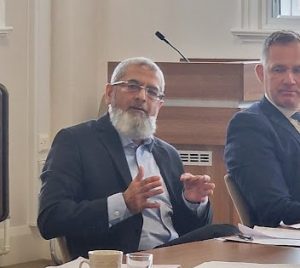
Kam Kothia
Kam Kothia, founder of Time2 Technology and a leading light in the Lancashire tech world, said that the UK is the third economy in technology world after the US and China. But that a UK digital strategy seemed to jump over Lancashire between Leeds, Liverpool and Manchester.
Again, he’s been encouraged by the long term Lancashire 2050 strategy and he’s been involved in putting a group together, including people from Lancaster University UCLAN, the public sector and businesses.
“The 2050 strategy was a breath of fresh air, because what businesses were saying is what they were crying out for, and that’s from micro businesses right through to multinational global companies, is they’re looking to back Lancashire, for dynamic leadership, some vision, with a can do attitude, because we want to do it.”
Cllr Phillippa Williamson, leader of Lancashire County Council said conversations with government over a devolution deal were progressing well: “We really see our role as key enablers to business. And we put a lot of effort into understanding how we can we can do that well, not just say the words we say but how we deliver.
“I’ve put a lot of effort over the last 18 months into really building relationships between all the local authorities across Lancashire to talk as one with one voice. But crucially, my particular work coming out of all of that is to present a credible voice to government as a local authority. We want to be seen as people who can you can do business with that can actually help you fix stuff. And we’re starting to see that.”
Further comments on the manufacturing sector from this discussion will be in a separate story coming soon.
Invest North is being led by TheBusinessDesk.com, in partnership with Northern Powerhouse Partnership, Squire Patton Boggs, Phoenix Group, and Lloyds Bank. It is also being supported by the Northern Powerhouse Investment Fund, Curveblock and Influential.
The project steering committee also includes NP11 chair Sir Roger Marsh, Piece Hall chief executive Nicky Chance-Thompson, and public affairs specialist Joe Dancey from Endeavour Advisory.





